Our Blog - Market Blog
One of the things that drew us to moving to France for retirement was the different lifestyle that there is within European cities. It is somewhat like what you can see in Manhattan, or potentially downtown Boston, downtown Chicago, downtown San Fransisco. The lifestyle includes public transportation, walking around the city, markets, neighborhood stores. Markets are in that list, and is one of the things that interests us about living here. There are Farmer's Markets within the US in various areas, including Raleigh, and there is/was a small farmers market within one of the housing areas in Morrisville. We also happened upon one when we were in Chicago walking around. There are quite a few in NYC, like the one in Union Square, where farmers within the local areas outside of the city come in a couple days a week and set up a stall in the square to sell their products. Markets are very central to French towns and cities and they tend to be everywhere. In Toulouse, there are multiple markets ... some covered, some open .... some that sell food and others that sell clothes and books ... some organic and some not. You can always get your fruit, vegetables, meats, fish, and breads at the supermarkets here, but many go to these markets. And with refrigerators as small as they are in some apartments, you go quite often :-)
Almost the first thing that we purchased here was a cart. We also had one in Paris when we lived there, and they are used by Toulousans young and old. We looked at a few different ones and settled on this little one. The carts range from the pretty basic (like ours) to some with built-in cooler sections for your meats. Some have these little basic wheels, while others have industrial-strength wheels. Buying a cart seems similar to buying a suitcase ... there is a large range of prices (from like $20 up to over $100) and various options around wheels (the wheels seem to be the key thing in the cart). We are somewhat worried about how long these little wheels will last, but we weren't quite ready to drop a hundred bucks on a cart!

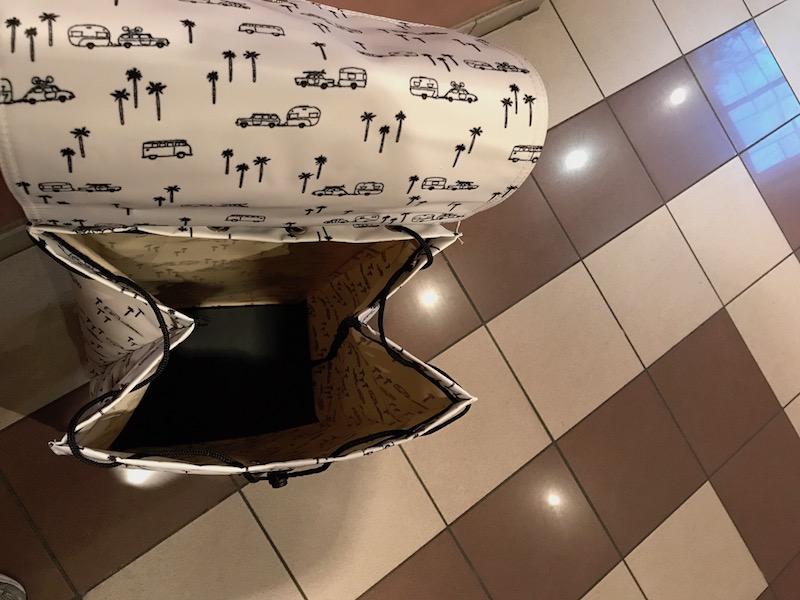


There are several markets here of different sizes and makeups. The city of Toulouse lists them on their website, which is quite helpful. There are 3 main covered markets: Carmes, Victor Hugo, and St. Cyprien. Then a very large open market called Marché Cristal, which has a larger selection of fruits and vegetables than the covered markets, but really not much in the way of meats or fish (some, but not much). Right now, we try to shop 2-3 days a week and shop for 2-3 days at a time. The main markets are open Tuesday thru Sunday (never on Monday) and from about 8 until 1:30. In general, we go through Marché Cristal for our fruits and veggies, then either Victor Hugo or a local stand-alone butcher near our first apartment for our meats. We try to eat fish once a week, so that shopping trip we do our meats and fish at Victor Hugo, and if we are only getting meats (no fish), then the butcher near our first apartment is good. We've made our way through a set of markets throughout the city to check them out and took a few pictures to give a view of what is here.
The first market is a little flower market at the end of the street where our first apartment was. They get there and setup, putting up their umbrellas and setting out all of the plants and flowers. They have both cut flowers and planted flowers. You also can buy various potted herbs: mint, parsley, thyme, basil ... that you can have out on your balcony. Now that we are in a longer-term apartment, I am looking forward to having flowers and my own little fresh herb garden! This past weekend, we did a road-trip out of town to IKEA but they had sold out of their rectangular planters that hang on a rail, so perhaps this week I'll get a couple from the Mr. Brico next door. We did pick up a couple small potted plants and a couple small potted flowers for the apartment as well, so that it actually seems more like a home.

This is Marché Cristal, the open market where we our fruit and veggie shopping. It doesn't bother us too much now, but we're not sure what it will be like to be trying to do your shopping in the pouring rain or during the cold, windy winters. It is much larger than we thought it originally would be, with lots of fruit and vegetable vendors. There are also 2 stalls that sell olives, dried fruits, and nuts, as well as a couple bread vendors, a couple butchers, a fishmonger, and a couple cheese vendors. There are 2 different trucks that have rotisserie foods (rotisserie chicken and other meats, as well as potatoes that have basically been cooking all morning in the fat that drips off the meats as they cook). There is a tea cart and one cart that sells various spring rolls and other asian foods that you can take home and heat up. They is one guy who sells honey on Sundays and a fresh pasta cart on Thursdays. We've started to have a few vendors that we like and tend to go to them. One thing that we have noticed is that while some things are always there, a large set of things are very seasonal. For example, when we first got here, there were lots of apples .. now there is basically only 1 apple vendor. For about the first 2 months, there were TONS of strawberries everywhere ... now, you can still get them from a few vendors but not many. Then came Cherry season and there was one vendor that basically ONLY sold cherries (we called him the cherry guy). Mind you ... as soon as cherry season ended, he moved to other fruits and melons. It is now high season for peaches, nectarines, plums, and apricots and there are TONS of them ... and they are pretty inexpensive ... running about between $1.50 and $2.50 per kilo, so about 70 cents to $1 a pound (give or take). Most of the vendors, you pick whatever you want and put it in baskets and then they weight everything. In some cases, you can ask them to help you pick things (like ... I want a mango to eat tomorrow or the next day, and they will feel to get you one that will be perfectly ripe when you plan to eat).
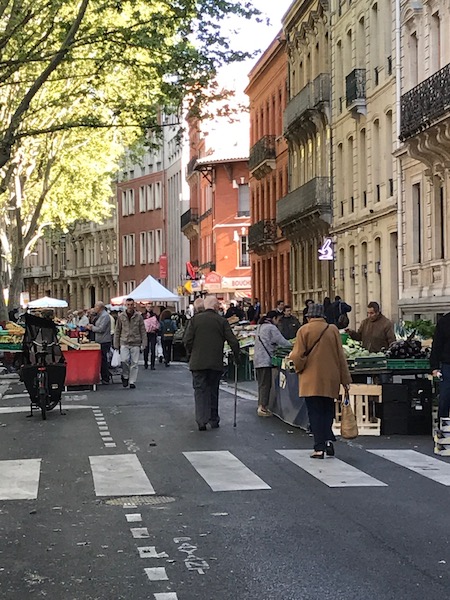


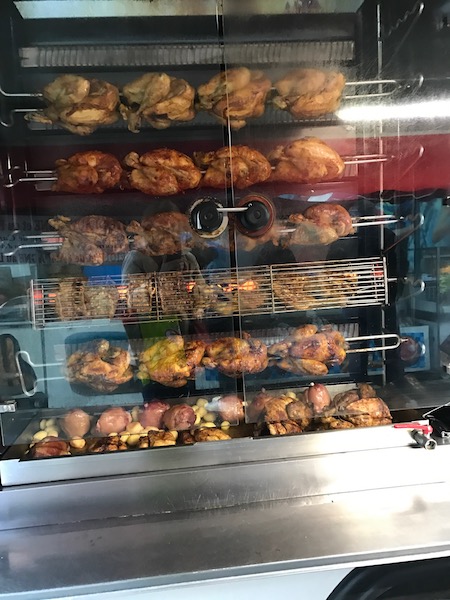
Organic products (called "bio" here) are catching on a little bit and there are a few organic markets and stores around town. There is an organic market in Place du Capitole on Tuesdays and Saturdays. The day we went by, it was actually behind the Capitole in Square General De Gaulle, and it was much smaller than the pictures on the website would indicate. Perhaps we caught it on a bad day, so we're going to make a note to try again in a few weeks.
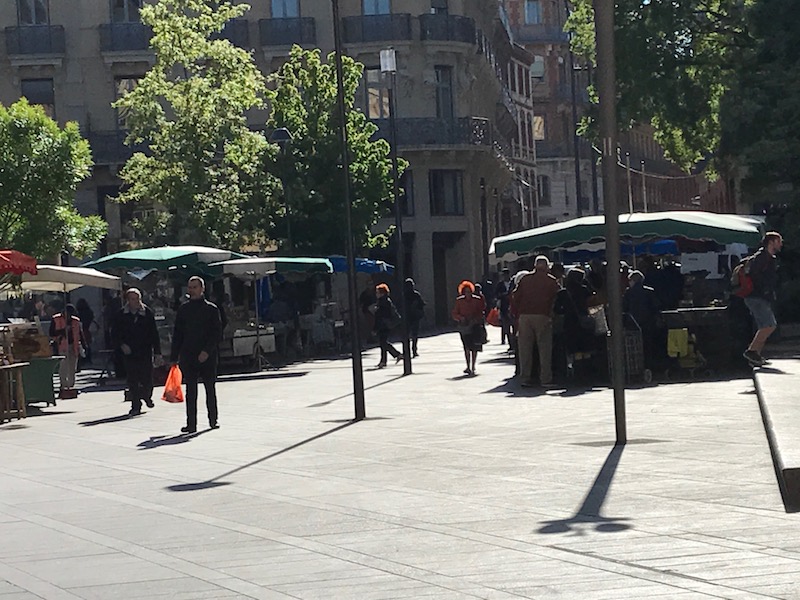
We went by another open marché at Place Saint-Georges, but it was very small ... just 2 fruit and veggie vendors. There was a boulangerie and a butcher store around the place itself, so at least if you live in the area, you can get the various things you need.

We then made our way across the river (the Garonne) to the area called Saint-Cyprien, which dates back to 1177. This is a very "cosmopolitan" area that used to be a "faubourg" (suburb). At the time of the great floods of 1875, this area of the city was flooded, with the water rising to about 3.5 meters above ground in some places. Over 1,000 houses collapsed and the residents, which numbered over 30,000, had to flee to areas further from the river. In the late 1800's, the idea to create a new market in Saint-Cyprien was started as it was quite a bit away from the city center of Toulouse and, therefore, food was a bit harder to come by locally. After a few starts and stops, the market was finally built and opened in 1892. Saint-Cyprien is the only one of the 3 covered markets that remains in the original market building (the others were rebuilt to add parking).
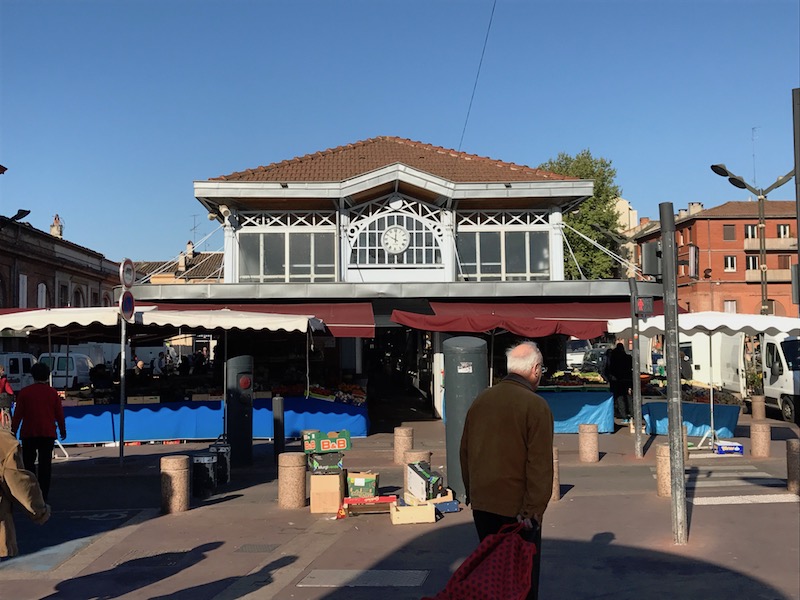


There is a small market on the Place du Ravelin, also in the Saint-Cyprien area. This is a weekly market only on Wednesday and Friday mornings, and it has a unique set of vendors. There are fruits, vegetables, cheeses, and meats, like most of them. But there were also a few others with spices, jams, honey, and cooked delicacies. We really saw a few things that were very interesting and so I anticipate making the little trip across the river to pick up a few things to try later.
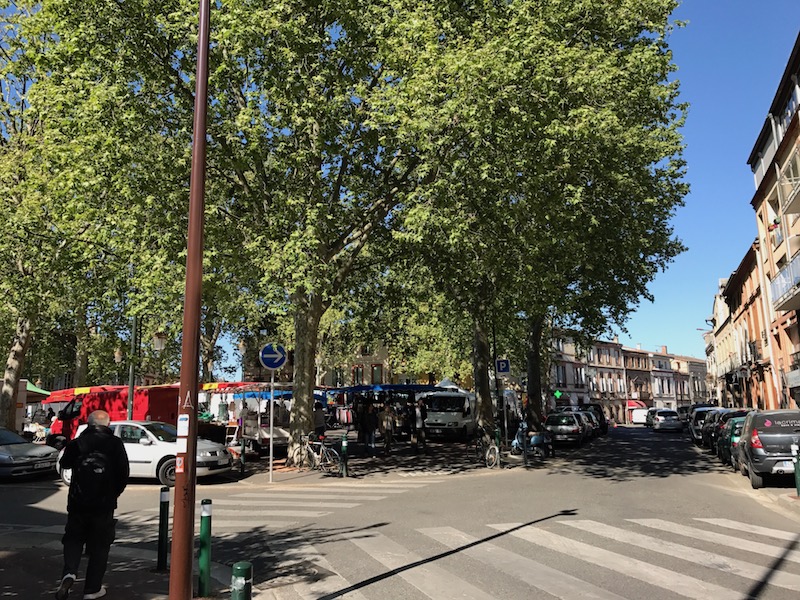
Marché Victor Hugo is the largest covered market within the city and has a variety of vendors: fruits, vegetables, fish, meat, cheese, bakery goods. But then there are also some pre-made foods that you can buy, a bar, one that sells only products from Portugal. The market dates back to 1827 when the city walls (from the Middle Ages) were demolished and the market was built. At that time, it was called Marché-au-Bois and was renamed Victor Hugo in 1886. In 1889, the new mayor of Toulouse wanted to create a series of covered markets in the various quarters of the city and called on architect Joseph Galinier to come up with plans for markets that would resemble those of the Paris Les Halles market. The new market was opened in 1892 (along with Carmes and Saint-Cyprien). We found a picture of the old Marche, which you can somewhat see the resemblance to the Saint-Cyprien market.
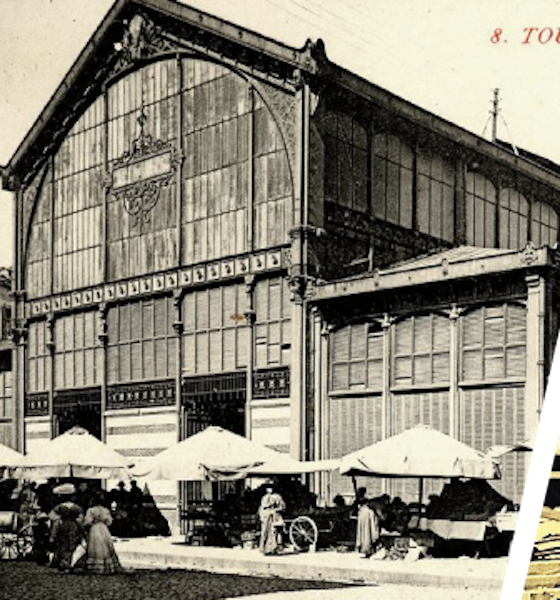
Fast-forward to 1959, and there was now a need for parking and the Victor Hugo and Carmes markets were demolished and rebuilt to be more modern and to include a parking garage along with the market. The market is on the ground floor, the 1st floor (French 1st floor, American 2nd floor) houses a set of restaurants, and then the parking garage is on top. You can see that in these pictures ... the green balcony that sticks out is where the restaurants are, and then the 4 levels of parking.
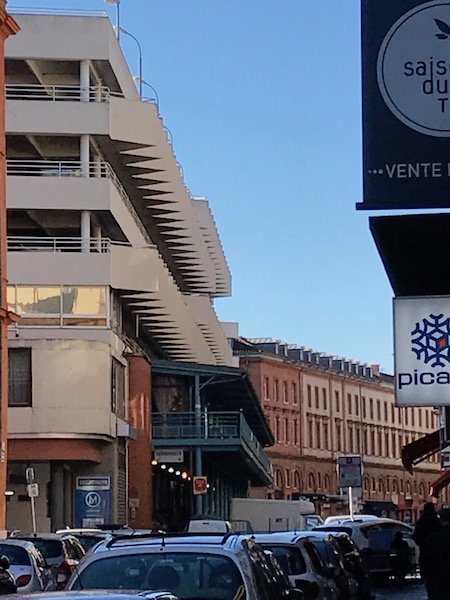

The fruits and vegetables are outside in this market, along with a flower vendor, and then inside is everything else. A note on this market ... it is undergoing a HUGE renovation project and it is going to be closed for the entire month of August! One of the fishmongers also has a stand-alone store near the market so at least we can still get our fresh fish.


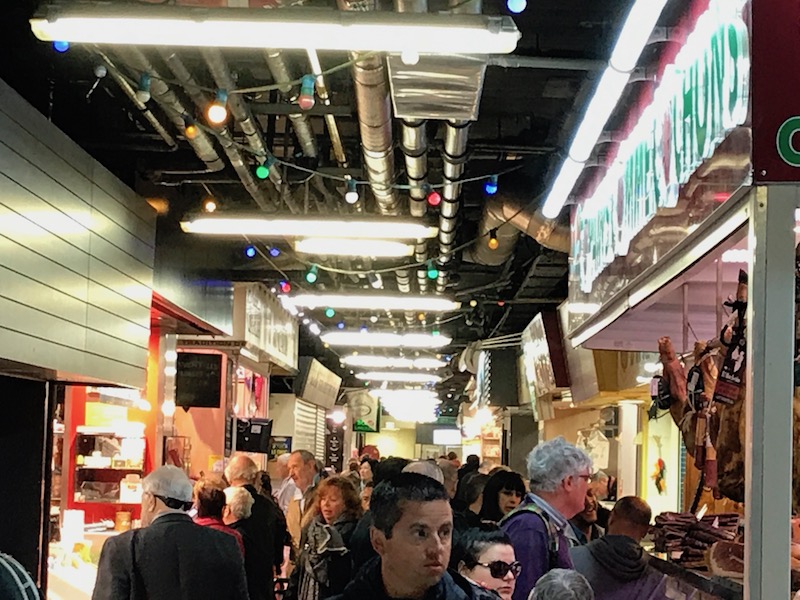

I wanted to give a view of the full process, so I grabbed some pictures of Tom shopping within Marché Victor Hugo for fish and beef, and then Marché Cristal for fruits and veggies. We'll start off with the fish. Here, Tom talks to the fish monger and points out which type of fish and indicates how much (600 grams or so). In some cases, you would just tell the fishmonger which exact fish or filets you want, or you need enough for x number of people. If you buy the whole fish, you can ask them to scale it and/or filet it as well if you want. The prices are based on if you are paying for the whole fish or just the filets. For example, the same fish will be cheaper per Kg for the whole fish because you are paying for the head and bones that you aren't going to eat. Many people will either get the whole fish and cook it that way, or get it filleted but then also take the bones and head home to make a fish broth from to use later.
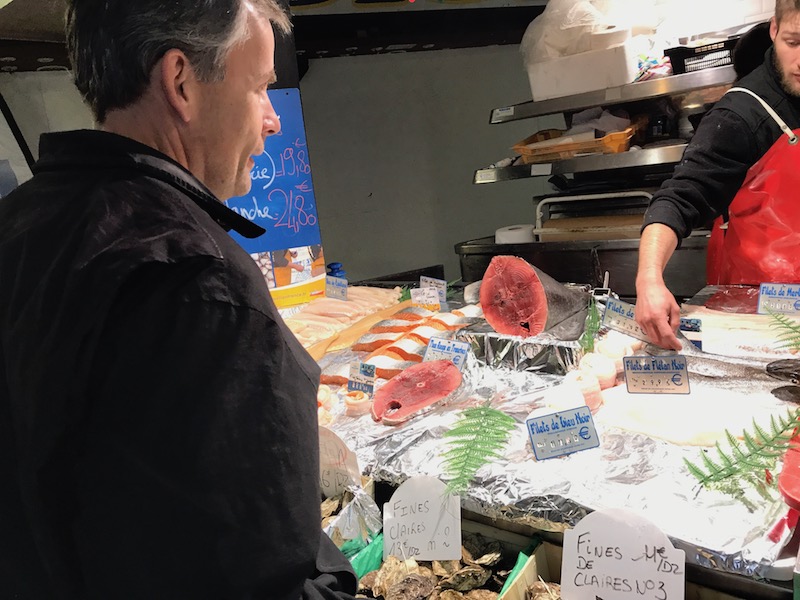
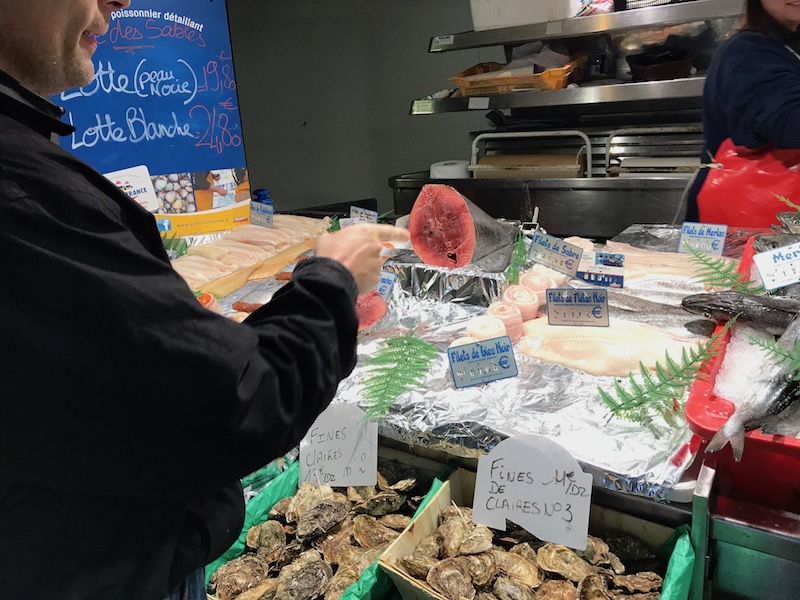
Then the fishmonger weighs it and wraps it up. Then hands the bag to Tom and Tom hands over the cash.
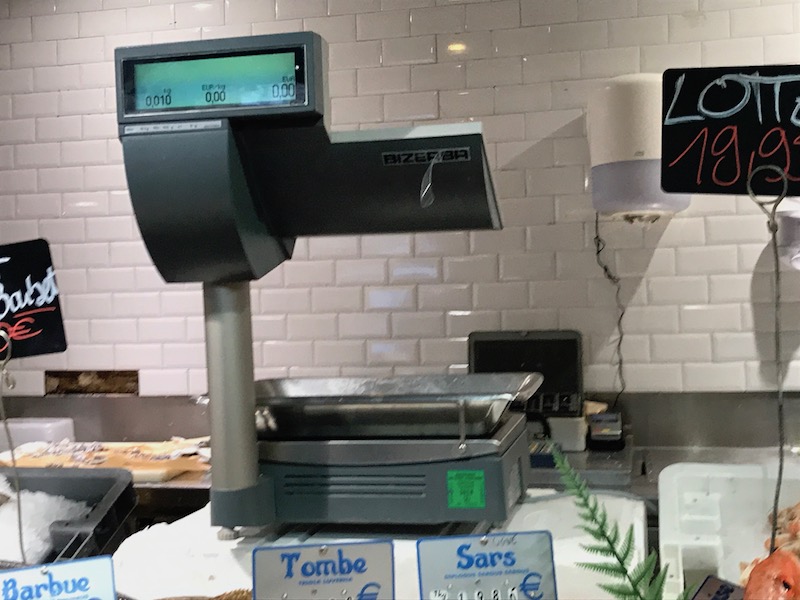

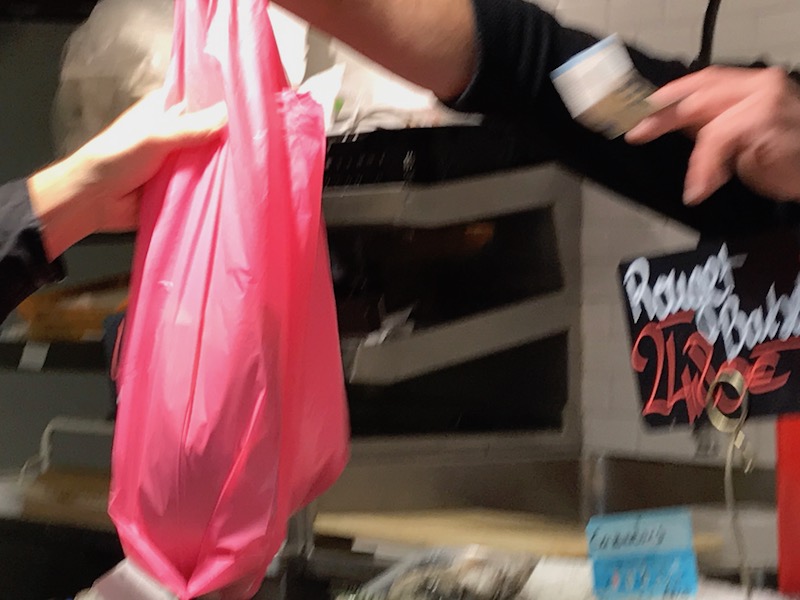
Getting meats is similar although there are some things that are unique. While most of the fish mongers in the market have fish and shellfish, most of the butchers are specialists ... either beef & veal, or lamb, or pork, or poultry, or horse (yes, there is 1 butcher that sells horse meat). There are multiple beef butchers and a few have both beef and pork but in general, the poultry vendors are pretty much just poultry. Some are quite small (like this one). Here, we asked for a specific amount of beef, and the butcher puts the knife on it and says "comme ca" (like this?) ... and he is saying that 600 grams (in our case) would be about this big of a chunk. You can ask them to slice it smaller, or cut it into chunks, etc. The weighing and paying works the same.
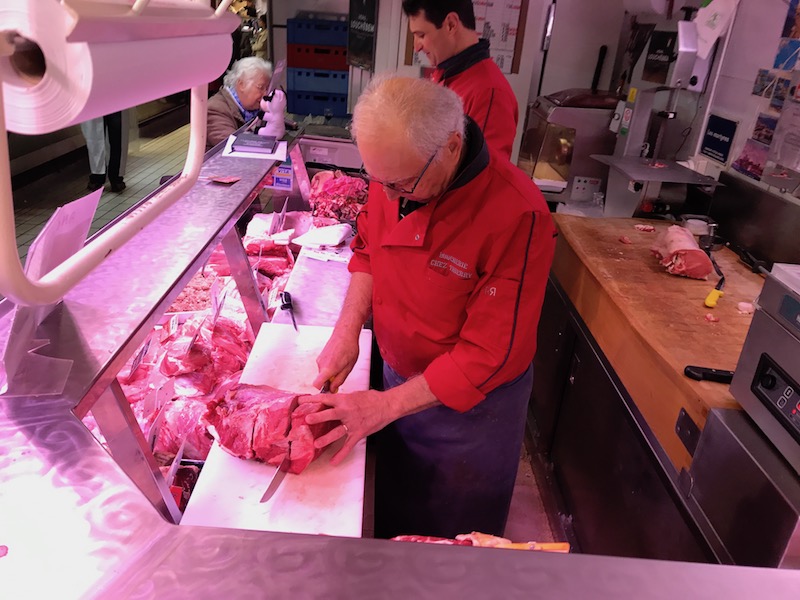
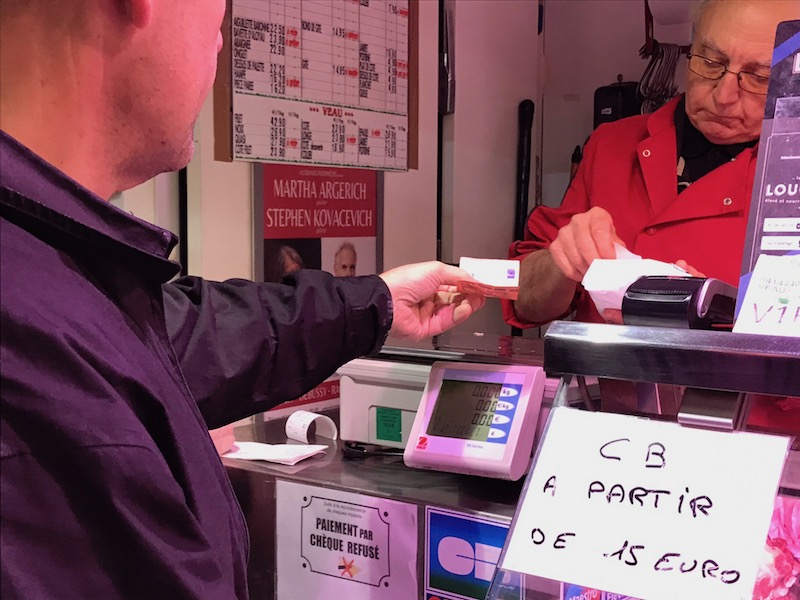
You may wonder why Tom is handing over cash all the time. Well, if you look at the previous picture, there is a sign that says "CB a parter de 15 euro", which means there is a 15 euro minimum when you use a credit/debit card. So we were just picking up 1 thing at a vendor and we didn't quite get up to 15 euros, so we ended up needing to pay cash for things. In general, we pay cash at the various markets (even if we go over 15 euros) and in places where we are under 15 or 20 euros (coffee, lunch).
Here is just a view of one of the vendors, and you can see the various cuts of meat. Here there are a few things of pork as well as some house-made sausage.
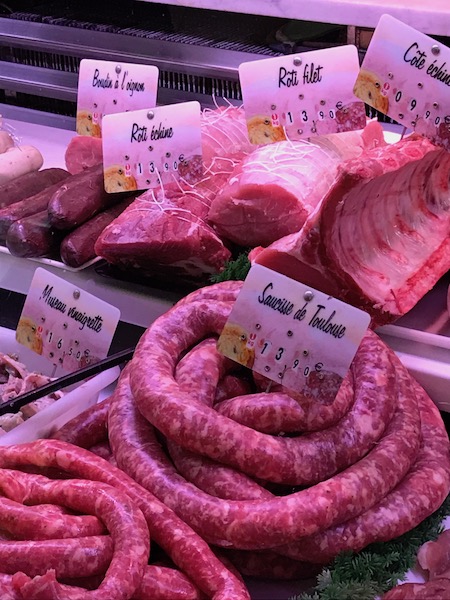
Now we are back at the Marché Cristal. Here, you get a basket from the vendor (they all have baskets) and then you add into the basket the items you need to buy. There are a couple of items where you don't pick them up yourself (normally either marked that way, or the items that are back behind the vendors and you tell them what you want). Here you can see we are getting some tomatoes, garlic, and green beans.
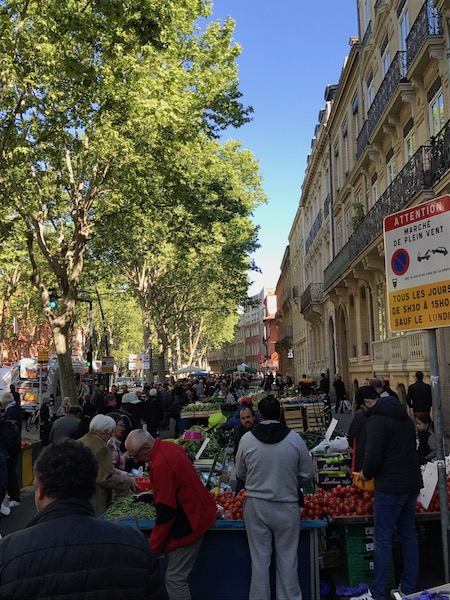


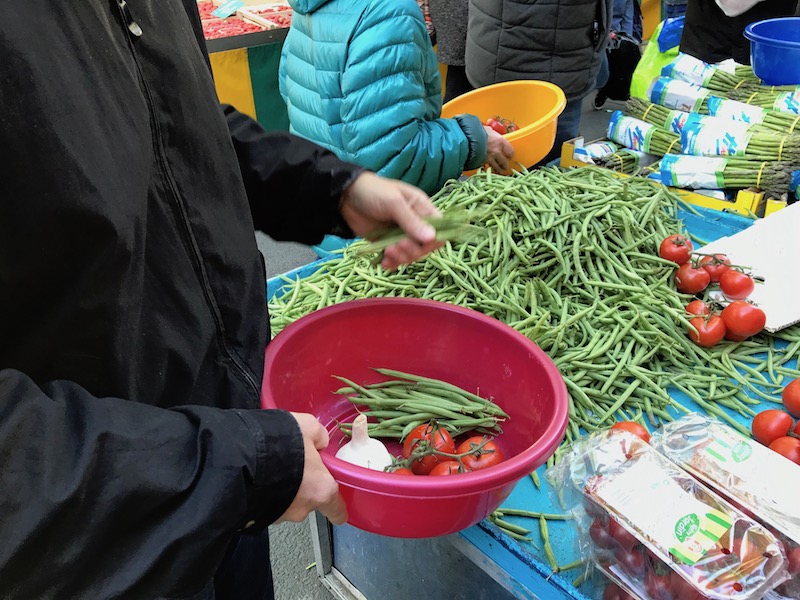
Then when it is your turn, you give your basket over and they'll weigh things out, add them all up, and tell you what you owe. They weigh everything in a basket, so you can see the red basket in the last picture on the scales. You can also see yet again that the signs will have what it is (here, Asparagus), the price (1.50 euros per bunch), and then the origin (Spain and the Ivory Coast).
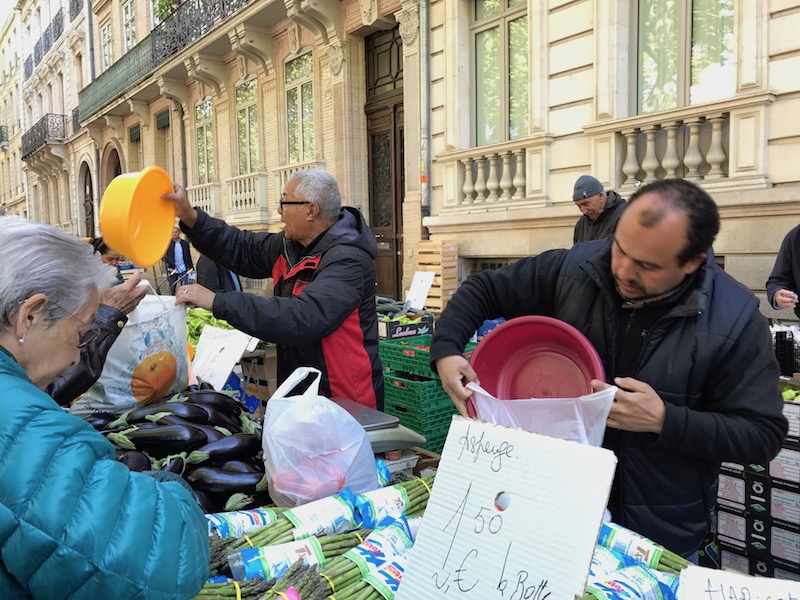

So our normal week includes 2 days of market shopping, one for 3 days and the other for 2 days, then we eat out dinner 2 nights a week. We try to do as much shopping at the markets as possible, then we augment that with specialty stores like the asian market, a fromagerie (cheese) or a boulangerie (breads). For cleaning products and other things like flour and sugar, there are several larger chains like Carrefour and Casino nearby. Spices can be bought at a couple of the markets by the gram (like 100 gr) and in several small epiceries around town that we have found, in addition to the chain-stores. Since one of the reasons we moved to France is the "lifestyle" of going to the markets and small little neighborhood stores, we are focusing on getting as little as possible at the chain stores, even if it costs a little more.
There is also the concept of having "your" coffee place, "your" boulangerie, etc. There are articles and books that cover this topic ... think of the show Cheers where the people who work there *know* you ... same thought here. We tend to go to the same boulangerie (which was near our first apartment), and at least 2 of the people who work there (one may be the owner) know us, you can tell when we walk in. We get our bread there, we've gone for breakfast there, and we've stopped after the gym or in the afternoon just to get an espresso. Most of the time (other than just grabbing a baguette for dinner), we sit there and relax since he has tables and chairs both inside and outside. One day, we stopped by for 2 espresso's and a 1/2 baguette somewhat late in the afternoon. He didn't have any smaller 1/2 baguettes and you can see him looking around in back, and then he shrugs his shoulders, smiles at me, and pops a whole baguette in the bag but only charges us for the 1/2 baguette anyway. Another time, we asked for a baguette and instead of grabbing one from the pile (that may have been out for 30 minutes), he went in the back and grabbed a fresh WARM one right out of the oven for us. We also have "our" wine store (it is a chain, but we've picked one specific one out) and the guy who works there (Christophe, I think he is the ONLY guy who works there, so maybe he is the franchisee?) knows us. We ask him for recommendations on wines, and he is sure to mention when they are having special things, like a Rose wine tasting. He is taking the month of August for vacation, so the store will be closed (yes, the store closes for the whole month) and so we went by and picked up 12 bottles of wine the other day. He added another one into the box as his gift. THIS is why we moved to France! :-).